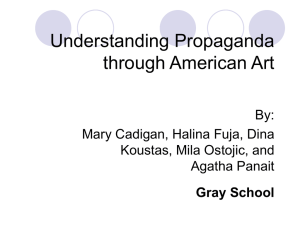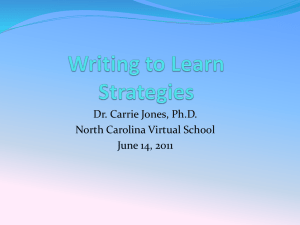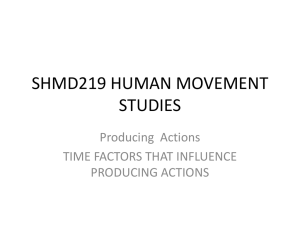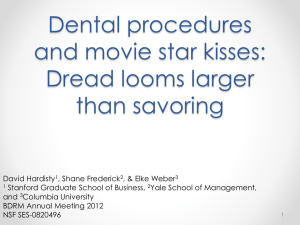The Concept of Anticipation In Whitehead`s Mature Work
advertisement
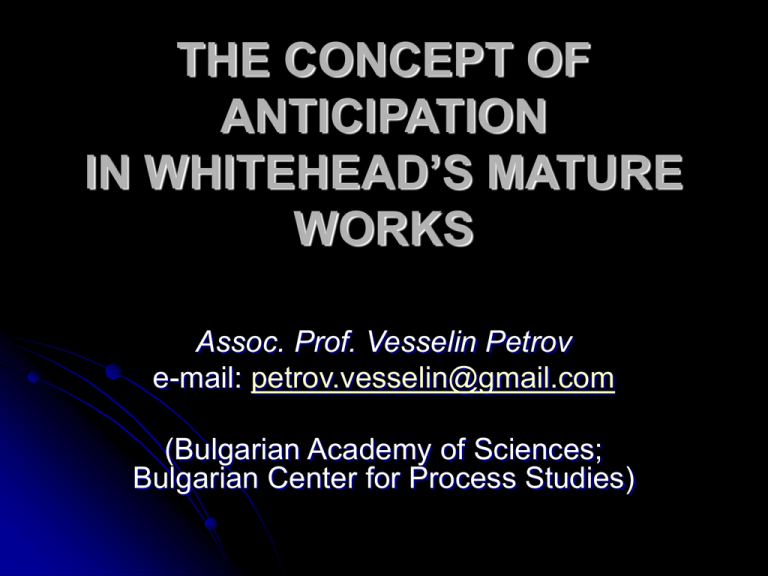
THE CONCEPT OF ANTICIPATION IN WHITEHEAD’S MATURE WORKS Assoc. Prof. Vesselin Petrov e-mail: petrov.vesselin@gmail.com (Bulgarian Academy of Sciences; Bulgarian Center for Process Studies) contents 1. Introduction 2. The notion of anticipation in Process and Reality 3. Anticipation as expressed in Adventures of Ideas and Modes of Thought 3.1. Anticipation in Adventures of Ideas 3.2. A comparison between Whitehead’s and St. Augustine’s ideas of anticipation 3.3. Anticipation in Modes of Thought 4. Brief comparison between Whitehead’s and Nikolai Hartmann’s views of anticipation 5. Whitehead’s thoughts on anticipation in Immortality (1941) 2 1. Introduction Let me first explain why I have chosen to talk about anticipation. Recently the notion of anticipation has received a great importance especially after the appearance of Robert Rosen’s books since 1985 and in connection with investigations on system theory, and in particular complex systems. 3 Rosen’s idea of anticipation is displayed in his definition of anticipatory system as “a system containing a predicative model of itself and/or of its environment, which allows it to change state at an instant in accord with the model’s prediction pertaining to a later instant”.[1] Later this idea has been developed by many other philosophers and scientists. [1] Rosen, R. (1985), Anticipatory Systems – Philosophical, Mathematical and Methodological Foundations, Pergamon Press. 4 In this regard the question naturally arises when the notion of anticipation has originated in philosophy and – what is much more interesting for us – if it appears with Whitehead. A number of authors have pointed in the last few years to the relevance of anticipation for process philosophy and for Whitehead’s thought. 5 For example, Mihai Nadin says that “… as a specific concept, anticipation insinuates itself in the language of science in the writings of Whitehead, Burgers, Bennet, Feynman, Svoboda, Rosen, Nadin and Dubois, i.e. since 1929.”[1] [1] Nadin, Mihai. (2010), “Anticipation and dynamics: Rosen’s anticipation in the perspective of time”, International Journal of General Systems, 1563-5104, Vol. 39, Issue 1, 2010, pp. 3-33. 6 The famous Australian process philosopher Aran Gare also points that “it is necessary to draw on the tradition of natural philosophy going back to the work of Herder, Goethe and Schelling. … It is the tradition of process metaphysics and includes Charles Sanders Peirce, Henri Bergson, Alfred North Whitehead and Ludwig von Bertalanffy.”[1] and adds that “Robert Rosen … also aligned himself with von Bertalanffy.”[2] [1] Gare, Aran. (2008), “Approaches to the question ‘What is life?’: reconciling theoretical biology with philosophical biology”, Cosmos and History: The Journal of Natural and Social Philosophy, Vol. 4, No 1-2. [2] Ibid. 7 The precise historical analysis will display that the origin of the contemporary ideas of anticipation lie much deeper in the history of philosophy and my further exposition will give some examples. I will not enumerate here all many authors that have spoken recently about anticipation. My task is different. 8 It is clear from the above quotations that anticipation is one of Whitehead’s important concepts. However, it has to be explained what is the meaning of anticipation with Whitehead, how this idea has been developed in his mature metaphysical writings and what is its place in his metaphysical system. 9 The aim of the exposition is namely to give the answers to all these questions. I shall follow Whitehead’s notion of anticipation first in Process and Reality (1929), then in Adventures of Ideas (1933) and in Modes of Thought (1938), and finally in one of his last works Immortality (1941). Some comparisons of Whitehead’s thoughts on anticipation with St. Augustine’s and Hartmann’s views of anticipation also will be made. 10 2. The notion of anticipation in Process and Reality In fact, Whitehead mentions anticipation even in his more early writings as Concept of Nature (1920) and Science and the Modern World (1925). For example, in Science and the Modern World he says: “Thus an event has anticipation: ‘The prophetic soul Of the wide world dreaming on things to come.’ These conclusions are essential for any form of realism.”[1] [1] Whitehead, A.N. (1967), Science and the Modern World, New York: The Free Press, pp. 72-73. 11 I will not analyze these early appearances of the concept of anticipation and will begin with the notion of anticipation in his mature metaphysical system developed in Process and Reality. Several aspects of Whitehead’s analysis of anticipation in this work can be outlined. 12 First, anticipation definitely plays a role in Whitehead’s criticism of Cartesian substancephilosophy. As Whitehead himself has put it “The anticipations are devoid of meaning apart from the definite cosmic order which they presuppose. Also survival requires order, and to presuppose survival, apart from the type of order which that type of survival requires, is a contradiction. 13 It is at this point that the organic philosophy differs from any form of Cartesian 'substancephilosophy.' For if a substance requires nothing but itself in order to exist, its survival can tell no tale as to the survival of order in its environment. Thus no conclusion can be drawn respecting the external relationships of the surviving substance to its future environment. For the organic philosophy, anticipations as to the future of a piece of rock presuppose an environment with the type of order which that piece of rock requires.”[1] [1] Whitehead, A.N. (1878), Process and Reality (corrected edition), New York: The Free Press, pp. 204-205. In the next quotations it will be used the abbreviation PR. 14 Another aspect displays the connection between anticipation and the subjective aim. Answering the question what the meaning of anticipation in Process and Reality is, Whitehead says: “The subjective aim, whereby there is origination of conceptual feeling, is at intensity of feeling (a) in the immediate subject, and (b) in the relevant future. This double aim —at the immediate present and the relevant future— is less divided than appears on the surface. 15 For the determination of the relevant future, and the anticipatory feeling respecting provision for its grade of intensity, are elements affecting the immediate complex of feeling. The greater part of morality hinges on the determination of relevance in the future. The relevant future consists of those elements in the anticipated future which are felt with effective intensity by the present subject by reason of the real potentiality for them to be derived from itself.” (PR 27) 16 He continues the explanation of his thought saying that “Thus so far as the immediate present subject is concerned, the origination of conceptual valuation according to Category IV is devoted to such a disposition of emphasis as to maximize the integral intensity derivable from the most favourable balance. The subjective aim is the selection of the balance amid the given materials. 17 Continuation of the quotation But one element in the immediate feelings of the concrescent subject is comprised of the anticipatory feelings of the transcendent future in its relation to immediate fact. This is the feeling of the objective immortality inherent in the nature of actuality. Such anticipatory feelings involve realization of the relevance of eternal objects as decided in the primordial nature of God.” (PR 278) 18 A third aspect of treating anticipation is connected with Whitehead’s thoughts about the species of process and the future’s objective reality. He says: “There are two species of process, macroscopic process, and microscopic process. The macroscopic process is the transition from attained actuality to actuality in attainment; while the microscopic process is the conversion of conditions which are merely real into determinate actuality. 19 Continuation of the quotation The former process effects the transition from the 'actual' to the 'merely real'; and the latter process effects the growth from the real to the actual. The former process is efficient; the latter process is teleological. The future is merely real, without being actual; whereas the past is a nexus of actualities.” (PR 214-215) 20 Next Whitehead continues: “the future has objective reality in the present, but no formal actuality. For it is inherent in the constitution of the immediate, present actuality that a future will supersede it. Also conditions to which that future must conform, including real relationships to the present, are really objective in the immediate actuality. 21 Continuation of the quotation Thus each actual entity, although complete so far as concerns its microscopic process, is yet incomplete by reason of its objective inclusion of the macroscopic process. It really experiences a future which must be actual, although the completed actualities of that future are undetermined. In this sense, each actual occasion experiences its own objective immortality.” (PR 215) Here Whitehead does not uses the concept of anticipation itself, but in fact he speaks about the notion of anticipation. 22 Yet another aspect of anticipation is discovered in Whitehead’s views about living and non-living societies. In the contemporary literature devoted to anticipation it is characterized usually as a property of living systems. However, many authors give examples for anticipation in nonliving systems and argue that in respect to the property of anticipation there is a small difference between living and non-living systems. 23 Whitehead’s thoughts in Process and Reality about life and living societies also give some food for thinking in that direction. He says: “Structured societies in which the second mode of solution has importance are termed ‘living’. It is obvious that a structured society may have more or less ‘life’, and that there is no absolute gap between ‘living’ and ‘non-living’ societies.” (PR 102) 24 And next he concludes that “In a sense, the difference between a living organism and the inorganic environment is only a question of degree; but it is a difference of degree which makes all the difference —in effect, it is a difference of quality.” (PR 179) 25 3. Anticipation as expressed in Adventures of Ideas and Modes of Thought These two books do not contain great changes in Whitehead’s notion of anticipation. But they explain in greater details this notion and in that sense they push forward the development of the ideas connected with anticipation. Let us begin with Adventures of Ideas. 26 3.1. Anticipation in Adventures of Ideas What is new here is Whitehead’s pointing on the functioning of anticipation as a way for fusion of appearance with reality and on the connection between anticipation and novelty: “When the higher functionings of mentality are socially stabilized in an organism, appearance merges into reality. … more generally dropping the special case of personality, the objective reality of the past, as it now functions in the present, in its day was appearance. 27 Continuation of the quotation They may be strengthened in emphasis, embroidered upon, and otherwise modified by the novel appearances of the new occasion. In this way, there is an intimate, inextricable fusion of appearance with reality, and of accomplished fact with anticipation. In truth, we have been describing the exact situation which human experience presents for philosophic analysis. 28 Continuation of the quotation We are apt to think of this fusion from the point of view of the higher grades of human beings. But it is a fusion proceeding throughout nature. It is essential mode in which novelty enters into the functionings of the world.”[1] [1] Whitehead, A.N. (1867), Adventures of Ideas, New York: The Free Press, p. 212. Italics mine. Next it will be pointed as AI. 29 On the other hand, Adventures of Ideas continues Whitehead’s argument in Process and Reality that there is no gap between living and non-living: “Another gap is that between lifeless bodies and living bodies. Yet the living bodies can be pursued down to the edge of lifelessness. Also the functionings of inorganic matter remain intact amid the functionings of living matter. … 30 Continuation of the quotation In the case of living bodies the coordination intervenes, and the average effect of these intimate functionings has to be taken into account. Those activities in the self-formation of actual occasions which, if coordinated, yield living societies are the intermediate mental functionings transforming the initial phase of reception into the final phase of anticipation. 31 Continuation of the quotation In so far as the mental spontaneities of occasions do not thwart each other, but are directed to a common objective amid varying circumstances, there is life. The essence of life is the teleological introduction of novelty, with some conformation of objectives.” (AI 207. Italics mine) Here he speaks also about the phases of anticipation (as is seen from my italics). 32 Another line of a more detailed explanation of the notion of anticipation in Adventures of Ideas is connected with the “presence” of the future in the present. Whitehead says: “But the sense in which the future can be said to be immanent in occasions antecedent to itself, and the sense in which contemporary occasions are immanent in each other, are not so evident in terms of the doctrine of the subject-object structure of experience. 33 Continuation of the quotation It will be simpler first to concentrate upon the relation of the future to the present. … Cut away the future, and the present collapses, emptied of its proper content. Immediate existence requires the insertion of the future in the crannies of the present.” (AI 191) 34 Here the concept of anticipation is not mentioned explicitly, but the only way in which future is possible to be present is through anticipation. And indeed, Whitehead continues: “…the future is not nothing. It lives actively in its antecedent world. … In the present, the future occasions, as individual realities with their measure of absolute completeness, are nonexistent. Thus the future must be immanent in the present in some different sense to the objective immortality of the individual occasions of the past. 35 Continuation of the quotation In the present there are no individual occasions belonging to the future. The present contains the utmost verge of such realized individuality. The whole doctrine of the future is to be understood in terms of the account of the process of selfcompletion of each individual actual occasion. This process can be shortly characterized as a passage from re-enaction to anticipation. 36 Continuation of the quotation The intermediate stage in this transition is constituted by the acquisition of novel content, which is the individual contribution of the immediate subject for the re-shaping of its primary phase of re-enaction into its final phase of anticipation. This final phase is otherwise termed the ‘satisfaction’, since it marks the exhaustion of the creative urge for that individuality.” (AI 192) 37 And again: “The future is immanent in the present by reason of the fact that the present bears in its own essence the relationships which it will have to the future. It thereby includes in its essence the necessities to which the future must conform. 38 Continuation of the quotation The future is there in the present, as a general fact belonging to the nature of things. … Thus the future is to the present as an object for a subject.” (AI 194) Thus “the earlier will be immanent in the later according to the mode of anticipation, as explained above.” (AI 197) 39 One of the inferences that we can draw from what is stated up to here is that future actual occasions are immanent in the present only by way of anticipation of the future by the present. Some authors think this means that “Anticipation yields only a weak sense of immanence. The future is immanent in the present only as a potentiality for becoming, to which the present activity is contributing limitations.”[1] [1] Christian, William. (1955), An Interpretation of Whitehead’s Metaphysics, New Haven: Yale Univ. Press, p. 124. 40 And also: “Among the feelings which compose A’s satisfaction are anticipatory feelings. A anticipates that some actual occasions will supersede it and that these occasions will conform to it when they become actual. M is present in A only as a possible value for this variable. Only in this weak sense is the future immanent in the present.” [1] [1] Ibid. 41 If we assume this opinion, it will mean that Whitehad’s understanding of anticipation is weaker than the contemporary strong sense of anticipation. I suggest it will be better not to take such decision in a hurry. Whitehead’s thought is deeper that sometimes it looks like. 42 Now, as an inference of the analysis of the concept of anticipation as expressed in Process and Reality and in Adventures of Ideas I can agree with Wolfhart Panenberg’s remark that “Already in Process and Reality Whitehead himself spoke occasionally of anticipatory feelings with respect to subjective aim (PR 278/428f.; cf. 214f./327f.). 43 Continuation of the quotation He did so above all in Adventures of Ideas (AI 250f.). … Whitehead does not … describe the significance of anticipation for the formation of the subject, as constituting its subjectivity out of a future which already determines the present by way of anticipation. 44 Continuation of the quotation Rather in Whitehead, anticipation means that the subject, constituting itself in the present, includes also its future relevance for others (its “objective immortality”) in the act of its self-constitution. Whitehead did not exhaust the theoretical potential of the element of anticipation implied in the concept of “subjective aim”. … 45 Continuation of the quotation Although this resulted in turning the action of the future end upon the present becoming into the effectiveness of a living organism’s seed with respect to its future end, he nevertheless spoke of an effect of the end upon the process of becoming. This does not happen in Whitehead, because he sees becoming in each of its stages as self-constitutive. That is why, despite his use of teleological language, the element of anticipation cannot really become constitutive in his interpretation of subjectivity.”[1] [1] Panenberg, Wolfhart. (1984), “Atom, Duration, Form: Difficulties with Process Philosophy”, Process Studies, Vol. 14, No 1, p. 28. 46 3.2. A comparison between Whitehead’s and St. Augustine’s ideas of anticipation What is interesting in this regard is that Whitehead’s idea of anticipation reminds us to St. Augustine’s consideration of past, present and future (Confessions, Book 11, chapters 14-31). In these chapters Augustine talks about time and its past, present and future. He uses several times the term “expectation” (in Latin “expectatio”). 47 Let me give some quotations: “The time present of things past is memory; the time present of things present is direct experience; the time present of things future is expectation.” (Confessions, Book 11, chapter 20, italics mine[1]). [1] I use the following edition: St. Augustine. Confessions (newly translated and edited by Albert C. Outler). Grand Rapids, MI: Christian Classics Ethernal Library, 2000. (Print Basis: Philadelphia: Westminster Press [1955], Library of Christian Classics, Vol. 7). 48 Further Augustine says: “But how is the future diminished or consumed when it does not yet exist? … For the mind expects, it attends, and it remembers; so that what it expects passes into what it remembers by way of what it attends to. Who denies that future things do not exist as yet? But still there is already in the mind the expectation of things still future. … 49 Continuation of the quotation Therefore, future time, which is nonexistent, is not long; but “a long future” is “a long expectation of the future”. … The span of my action is divided between my memory, which contains what I have repeated, and my expectation, which contains what I am about to repeat.” (Confessions, Book 11, chapter 28; italics mine). 50 And Augustine continues: “For it is not as the feelings of the one singing familiar songs, or hearing a familiar song in which, because of his expectation of words still to come and his remembrance of those that are past, his feelings are varied and his senses are divided.” (Confessions, Book 11, chapter 31; italics mine). 51 We see that Whitehead develops further Augustine’s thoughts on “expectation” in the mature and elaborated contemporary metaphysical concept of anticipation. It is not strange, because Whitehead has thought that the transition from the pre-modern to the modern way of thinking is in fact a transition from rational to historical thinking. This does not mean that he goes back to the way of thinking that was dominant before the epoch of modernism. 52 We know that Whitehead is a postmodern thinker (a constructive postmodernist), however his postmodernism gives back to us something of the rationality of the pre-modern epoch that was rejected by the modern thinking[1], but at the same time Whitehead gives further and new postmodern development of that pre-modern elements of rationality. The above comparison with St. Augustine concerning the origin of the contemporary concept of anticipation is a good example in this regard. [1] For more detailed analysis see Cobb, John, Jr. (1993). Alfred North Whitehead. In: Griffin, D.R, Cobb, J., Jr., etc. (Eds.) (1993). Founders of Constructive Postmodern Philosophy: Peirce, James, Bergson, Whitehead, and Hartshorn. Albany: SUNY Press, pp. 167-170. 53 3.3. Anticipation in Modes of Thought In Modes of Thought anticipation is mentioned explicitly only twice. The first one is in connection with Descartes’ philosophy: “There were other sides to Descartes’ cosmology which might have led him to a greater emphasis on motion. For example, his doctrines of extension and vortices. But in fact, by anticipation, he drew the conclusion which fitted the Newtonian concepts.”[1] [1] Whitehead, A.N. (1968), Modes of Thought, New York: The Free Press, p. 145. Next will be quoted as MT. 54 The second one is in connection of the teleological aim. Here is the full quotation: “I find myself as essentially a unity of emotions, enjoyments, hopes, fears, regrets, valuations of alternatives, decisions – all of them subjective reactions to the environment as active in my nature. My unity – which is Descartes’ “I am” – is my process of shaping this welter of material into a consistent pattern of feelings. 55 Continuation of the quotation The individual enjoyment is what I am in my role of a natural activity, as I shape the activities of the environment into a new creation, which is myself at this moment; and yet, as being myself, it is a continuation of the antecedent world. If we stress the role of the environment, this process is causation. If we stress the role of my immediate pattern of active enjoyment, this process is selfcreation. 56 Continuation of the quotation If we stress the role of the conceptual anticipation of the future whose existence is a necessity in the nature of the present, this process is the teleological aim at some ideal in the future. This aim, however, is not really beyond the present process. For the aim at the future is an enjoyment in the present. It thus effectively conditions the immediate self-creation of the new creature.” (MT 166. Italics mine.) 57 However, there are many passages that contain no explicit mentioning of the concept of anticipation, but in fact are closely connected with the idea of anticipation. It is valid especially of Chapter 8 in the book entitled “Nature alive” that has been published for the first time in 1934 as the second of the two lectures with the common title Nature and Life re-published in Modes of Thought. All such passages treat the topic of life and explain further Whitehead’s statement in Process and Reality that there is no gap between living and non-living. I shall point only to some of them. 58 He says: “…this formulation of the problem in terms of minds and matter is unfortunate. It omits the lower forms of life, such as vegetation and the lower animal types. These forms touch upon human mentality at their highest, and upon inorganic nature at their lowest. … The doctrine that I am maintaining is that neither physical nature nor life can be understood unless we fuse them together as essential factors in the composition of “really real” things”” (MT 150) 59 And next: “How do we add content to the notion of bare activity? This question can only be answered by fusing life with nature. In the first place, we must distinguish life from mentality. Mentality involves conceptual experience, and is only one variable ingredient in life. The sort of functioning here termed conceptual experience is the entertainment of possibilities for ideal realization in abstraction from any sheer physical realization. … 60 Continuation of the quotation Life lies below this grade of mentality. Life is the enjoyment of emotion, derived from the past and aimed at the future. It is the enjoyment of emotion which was then, which is now, and which will be then. This vector character is of the essence of such entertainment.” (MT 166-167) 61 The conclusion from the last quotations that there is no so big gap between living and nonliving is in agreement with the conclusion of many contemporary philosophers investigating anticipation that in respect to anticipation there is no gap between living and non-living. Let me give in this regard Whitehead’s analysis of nature into four main types: 62 “Thus in nature we find four types of aggregations of actualities: the lowest is the nonliving aggregation, in which mutual influence is predominantly of a formal character expressible in formal sciences, such as mathematics. The inorganic is dominated by the average. It lacks individual expression in its parts. … The vegetable grade exhibits a democracy of purposeful influences issuing from its parts. … 63 Continuation of the quotation The animal grade includes at least one central actuality, supported by the intricacy of bodily functioning. … The human grade of animal life immensely extends this concept, and thereby introduces novelty of functioning as essential for varieties of importance.” (MT 27-28) In this way we see Whitehead’s gradation of aggregations of actualities that argues that the distinction between living from non-living is a matter of degree. 64 4. Brief comparison between Whitehead’s and Nikolai Hartmann’s views of anticipation Nikolai Hartmann’s ontological theory has been developed in contradiction with the neo-Kantian and phenomenological movements. The same is valid to a great extent also for Whitehead’s theory and in this regard there are many similarities between the both thinkers. But this does not mean that their ideas are identical; there are specific differences between them. 65 I shall point here only the similarity and differences in their teachings concerning the idea of anticipation especially with respect of the problem of time discovering in this way also some similarity between Hartmann’s ideas of anticipation with the above discussed St. Augustine’s ideas. In this discussion I shall use the existing recent interpretations of Hartmann’s idea of anticipation. 66 If the past and the future with Hartmann were non-being, then “past and future cannot exert any influence over the present because non-being cannot influence being. … The only way out is to acknowledge that both past and future are.”[1] It follows from here that anticipation is possible according to Hartmann, only if past and future are being. The difference between past, present and future is not a difference between being and non-being; the difference is that past is no longer actual and future is non-actual.[2] [1] Poli, Roberto. (2011). On the Ontological Nature of Time. A Forgotten Chapter form Hartmann’s Philosophy of Nature, submitted. Italics in the original. [2] Ibid. 67 Talking about the future, Hartmann is referring to a representation of the future, an image or idea.[1] “This image … is always a “real” being, a present anticipation of the future. … The future, as such, does not have an ontological consistency … [and] that “vision” has a very complex structure”[2] connected with the analysis of the phenomenon of anticipation. [1] See Scognamiglio, Carlo. (2010). “Anticipation and the future vision in Nicolai Hartmann’s ontology”, Foresight, Vol. 12, No 3, 2010, p. 51. [2] Ibid. Italics in the original. 68 Hartmann writes in his work Teleologisches Denken that “What will be realized only in the future can influence the present only if in some way it “pre-exists” its realization; and on the other hand this is thinkable only if this pre-existing is intended as the reality of another way of being to which it has first to arrive. It should be also, through an inner strength, […] brought into presentness, but without already becoming real in the present.”[1] [1] Hartmann, N. (1951). Teleologisches Denken, De Gruyter, Berlin. The quotation is according to Scognamiglio, Carlo. Op. cit., p. 51. 69 According to Hartmann “the “future” is only immanent to cosciousness”, that is why anticipation with Hartmann is only a mental processing.[1] The conclusion from here is that anticipation with Hartmann is what he calls “a transcendent act”.[2] [1] Scognamiglio, Carlo. Op. cit., p. 51. [2] Ibid. 70 5. Whitehead’s thoughts on anticipation in Immortality After the publication of his book Modes of Thought (1938) Whitehead did not stop thinking about anticipation and its place in our world and, respectively, in his metaphysical system. We can find in his last public lecture Immortality (1941) the result and the development of his final thoughts on anticipation. 71 In this lecture Whitehead speaks about anticipation several times. At the beginning of the lecture he says: “…the World of Origination: It is the Creative World. It creates the Present by transforming the Past, and by anticipating the Future.”[1] Here he stresses on the importance of anticipation. Next in the lecture he again stresses on its importance and displays its connection with memory and from here with consciousness and life at all: [1] Whitehead, A.N. (1951). “Immortality”, Shilpp, P.A. (Ed.). (1951), The Philosophy of Alfred North Whitehead. The Library of Living Philosophers. Vol. III. (second edition). Open Court, 1951, pp. 682-700. Here p. 684. Next it will be quoted as Im. 72 “The discussion of this conclusion leads to the examination of the notions of Life, Consciousness, Memory, and Anticipation. Consciousness can vary in character. In its essence it requires emphasis on finitude, namely some recognition of ‘this’ and ‘that’. 73 Continuation of the quotation It may also involve a varying extent of memory, or it may be restricted to the immediacy of the present, devoid of memory, or anticipation. Memory is very variable; and except for a few scraps of experience, the greater part of our feelings are enjoyed and pass. The same statement is true of anticipation.” (Im 694) 74 The last mentioning of anticipation is the most important one: “…human experience can be described as a flood of self-enjoyment, diversified by a trickle of conscious memory and conscious anticipation. … When memory and anticipation are completely absent, there is complete conformity to the average influence of the immediate past. … When there is memory, however feeble and short-lived, the average influence of the immediate past, or future, ceases to dominate exclusively. 75 Continuation of the quotation There is then reaction against mere average material domination. Thus the universe is material in proportion to the restriction of memory and anticipation. According to this account of the World of Activity there is no need to postulate two essentially different types of Active Entities, namely, the purely material entities and the entities alive with various modes of experiencing. 76 Continuation of the quotation The latter type is sufficient to account for the characteristics of that World, when we allow for variety of recessiveness and dominance among the basic factors of experience, namely consciousness, memory, and anticipation. This conclusion has the advantage of indicating the possibility of the emergence of Life from the lifeless material of this planet – namely, by the gradual emergence of memory and anticipation.” (Im 695) 77 We see here, first, that Whitehead puts anticipation amongst the basic factors of experience together with consciousness and memory, and second, Whitehead develops his earlier statement that there is no gap between living and non-living in the statement that Life has emerged from the lifeless by the gradual emergence of memory and anticipation. 78 In this way, finally, anticipation receives its proper place in Whitehead’s metaphysical system. There is something symbolic in the fact that Whitehead says his last word on anticipation namely in his last public lecture. 79 The end 80


